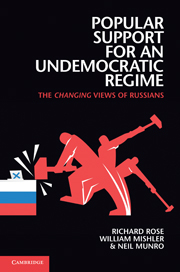Book contents
- Frontmatter
- Contents
- List of figures
- List of tables
- Introduction: The need for popular support
- 1 Democratic and undemocratic models of support
- 2 Changing the supply of regimes
- 3 Putin consolidates a new regime
- 4 Increasing support for an undemocratic regime
- 5 Individual influences on regime support
- 6 Time tells: there is no alternative
- 7 Finessing the challenge of succession
- 8 The challenge of economic reversal
- 9 Maintaining a regime – democratic or otherwise
- Appendix A New Russia Barometer samples
- Appendix B Coding of variables
- References
- Index
3 - Putin consolidates a new regime
Published online by Cambridge University Press: 05 June 2012
- Frontmatter
- Contents
- List of figures
- List of tables
- Introduction: The need for popular support
- 1 Democratic and undemocratic models of support
- 2 Changing the supply of regimes
- 3 Putin consolidates a new regime
- 4 Increasing support for an undemocratic regime
- 5 Individual influences on regime support
- 6 Time tells: there is no alternative
- 7 Finessing the challenge of succession
- 8 The challenge of economic reversal
- 9 Maintaining a regime – democratic or otherwise
- Appendix A New Russia Barometer samples
- Appendix B Coding of variables
- References
- Index
Summary
The ambiguous legacy that Vladimir Putin received from his predecessor at the start of the millennium was summed up in the subtitle of a book, Stability or Disorder? (Bonnell and Breslauer, 2001). In an address on taking office, the new president made his choice clear: political stability:
Russia has reached its limit for political and socio-economic upheavals, cataclysms and radical reforms. Only fanatics or political forces which are absolutely apathetic and indifferent to Russia and its people can make calls for a new revolution. Be it under Communist, national-patriotic or radical-liberal slogans, our country and our people will not withstand a new radical break up. The nation's patience and its ability to survive as well as its capacity to work constructively have reached the limit.
(Putin, 2000: 212)In striving toward this goal, Putin benefited from the popular desire for the consolidation of order after the turbulence of transformation (Carnaghan, 2007).
To introduce order in place of the existing disorder required institutionalizing a regime, whether democratic or undemocratic, that in one way or another could gain the support of its population (cf. Huntington, 1968; Figure 1.1). The Yeltsin administration's strategy had been to dismantle institutions central to the power of the Soviet party-state. Putin saw this as the Federation's powers being “highjacked.” His political strategy has been to repatriate to the state powers that had been appropriated by the regions and billionaire businessmen.
- Type
- Chapter
- Information
- Popular Support for an Undemocratic RegimeThe Changing Views of Russians, pp. 45 - 63Publisher: Cambridge University PressPrint publication year: 2011



